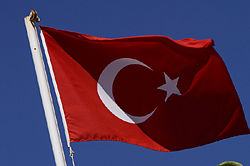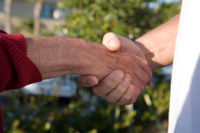Turkey Gift Giving Customs
From Giftypedia
Capital: Ankara
Languages: Turkish
Currency: Lira
Religion: Muslim
National Holiday: Republic Day, October 29
More Turkish Holidays
Turkey is a country rich in history and culture. A trip to Turkey will be filled with fun, adventure, excitement and will be educational. With an estimated 2700 historical sites, beautiful beaches, colorful bazaars and market places, you will always find something to do. Also, enjoy the famous Turkish cuisine that is considered by gourmets in the top three of the world.
If planning a trip to Turkey for business or vacation do some research on the customs. Here you will find some tips for Turkish gift giving etiquette along with social and business etiquette.
Turkish Gift Giving Practices and Etiquette
- If you are invited to a Turkish home, a gift for the host will be expected. Typically, gifts of pastries are given and Baklava is the most common. Decorative items such as vases, goblets or ornaments are also good choices.
- If children are present, then it is customary to bring them candy or a small gift.
- Birthdays are a common gift giving occasion. Gifts can be almost anything that match a person's interest and are similar in nature to what you'd give someone in the US for their birthday. Giving baby clothes and money are common gifts for a newborn baby.
- Public holidays, or Bayrams, and religious ceremonies are common gift giving occasions. Being a Muslim nation, they don't celebrate Christmas. Some have recently starting giving gifts for the New Year.
- Weddings are a very big occasion in Turkey. A traditional wedding gift from a guest is to give the bride, or the couple, is something gold like a bangle or most commonly gold coins. The value of the coin will depend on how close you are to the couple. The closer your relationship, the bigger the coin should be. It's okay for colleagues to go in as a group to give a coin. Many times the gold coins are pinned to the bride's dress. Many references state that a red silk bow should be fastened to the coin as well as a pin for attaching it to her dress. Money is also a common gift that is slipped into the bride's basket or purse.
- Gifts are given to someone who is leaving home to serve in the [[Military Training Graduation|military]. Sometimes gold coins are given.
- We've seen mixed messages on the appropriateness of flowers being given as gifts. Some say that flowers are not typically given. Others say, that it is appropriate and roses and carnations are typical. If you feel they would be appropriate, consult a local florist.
- Gifts should be immediately presented to the recipient when you arrive.
- Sometimes the recipient of a gift will open it right away, except at birthday parties where they typically wait until after the cake. Though, don't expect the host to open the gift immediately as generally taking care of the guest takes priority. If there is one or more guests, the hosts may not open the gifts in your presence due to them not wanting to make someone feel uncomfortable.
- Some sources say that you should open gifts immediately, thank them and let them know how much you like it. Other sources say that you should wait until later and not open a gift when given to you. We're still looking for a more definitive answer on this. Our current advice is to accept the gift and thank them without appearing overly eager to open it. If you feel that they'd like you to open it, then oblige.
- Do not give overly personal or lavish gifts.
- When considering alcohol as a gift, ensure the recipient drinks as Turkey is a Muslim country. A fine wine or liquor would be appropriate. Alcohol and depictions of the human body are prohibited by Orthodox Islam, consider if your host follows these strictures before giving this type of gift.
- If you will be staying in a Turkish home, it is advised to give additional gifts. Gifts related to your countries heritage, books or music are good choices.
- In business relationships, gift giving is generally not practiced. Sight seeing trips and dining are more appropriate forms of business relationship building. If you do decide on a gift, it won't be viewed as an insult, but avoid lavish gifts and it would be best if it's something that relates to your home country.
- If you're given a gift in a business situation and your company policy prohibits you from accepting it, be tactful when declining the gift by being careful not imply that the giver has any ulterior intentions. Say that you appreciate the gift and wish you could accept it and then explain your company's policy.
Turkish Social Etiquette
Useful Islamic Greetings...
Merhaba (mehr hah bah)
- Hello
Gunaydin (goon-ay-dun)
- Good Morning
iyi gunler (ee-yee gun-ler)
- Good Day
Nasilsiniz (na-sul-su-nuz)
- How are you?
Memnun oldum
- Nice to meet you.
Ben de memnun oldum
- I, too, am pleased to meet you.
- A firm handshake is the appropriate greeting.
- Unless you are greeted when entering a room, you should greet the eldest or most senior first.
- Friends and relatives will greet with 2 kisses to the cheek.
- Elders are greeted with a kiss to the right hand, and then you should draw their hand to your forehead as a sign of respect. This is appropriate from any gender to any gender, though the "elder" doesn't necessarily need to be old, but they need to be older than you; usually a generation or more apart. They will extend their hand toward you palm down. The "kiss" should be a light kiss to the knuckles, and some say in modern culture the lips should not actually touch the hand.
- It is important to maintain eye contact when conversing.
- Turkish etiquette is that the host pays for the meal when dining out.
- Breaks are frequently taken in between courses for a smoke and drinks.
- The host will not stop eating until the guest stops. It is considered rude to not finish the food on your plate. It is common to be expected to have second and third helpings; it is common to eat until you can't eat any more. Burping at the end of your meal is a sign that you are fully satisfied and have enjoyed your meal.
- One does not eat, drink or smoke without first offering to share.
- Do not fawn over items in a hosts house as you may unintentionally make them feel obligated to give it to you.
- In business, Turks should be greeted using their first name followed by "bey" (bay) for men and "hanim" (ha-num) for women. Punctuality is important for business meetings -- don't be late, though, don't call out someone else who is late.
- Gestures for "yes" and "no" are different in Turkey. Yes is indicated with a raise of the head upward, while a no is also a nod of the head upward accompanied by a raising of both eyebrows.
- Do not point the sole of your foot toward a person. Putting your thumb between your first two fingers is equivalent to giving the middle finger in the US.
- Line skipping is quite common. Best to be patient as there is not much you can do to change it.
Related Articles
- Turkish Holidays
- International Gift Customs
- How to Avoid Controversial or Inappropriate Gifts
- Etiquette for Office / Business Gift Giving
Resources




 Printer Friendly
Printer Friendly
